|
Books Should Be Free Loyal Books Free Public Domain Audiobooks & eBook Downloads |
|
|
Books Should Be Free Loyal Books Free Public Domain Audiobooks & eBook Downloads |
|
Books on Languages |
|---|
|
Book type:
Sort by:
View by:
|
By: Plato (428/427 BC - 348/347 BC) | |
|---|---|
 Timaeus
Timaeus
“Our intention is, that Timaeus, who is the most of an astronomer amongst us, and has made the nature of the universe his special study, should speak first, beginning with the generation of the world and going down to the creation of man…” ‘Timaeus’ is usually regarded as one of Plato’s later dialogues, and provides an account of the creation of the universe, with physical, metaphysical and ethical dimensions, which had great influence over philosophers for centuries following. It attributes the order and beauty of the universe to a benevolent demiurge – a ‘craftsman’ or god – fashioning the physical world after the pattern of an ideal, eternal one... | |
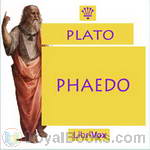 Phaedo
Phaedo
Plato's Phaedo is one of the great dialogues of his middle period, along with the Republic and the Symposium. The Phaedo, which depicts the death of Socrates, is also Plato's seventh and last dialogue to detail the philosopher's final days (the first six being Theaetetus, Euthyphro, Sophist, Statesman, Apology, and Crito).In the dialogue, Socrates discusses the nature of the afterlife on his last day before being executed by drinking hemlock. Socrates has been imprisoned and sentenced to death by an Athenian jury for not believing in the gods of the state and for corrupting the youth of the city... | |
 Phaedrus
Phaedrus
“For there is no light of justice or temperance, or any of the higher ideas which are precious to souls, in the earthly copies of them: they are seen through a glass, dimly…”Socrates and his earnest friend Phaedrus, enjoying the Athenian equivalent of a lunchtime stroll in the park, exchange views on love and on the power of words, spoken and written.Phaedrus is the most enchanting of Plato’s Erotic dialogues (capitalised in honour of the god). The barefoot philosopher urges an eager young... | |
By: Edwin Abbott Abbott (1838-1926) | |
|---|---|
 How to Write Clearly Rules and Exercises on English Composition
How to Write Clearly Rules and Exercises on English Composition
| |
By: Rabindranath Tagore (1861-1941) | |
|---|---|
 Gitanjali
Gitanjali
Gitanjali is a collection of 103 poems in English, largely translations by the Bengali poet Rabindranath Tagore. This volume became very famous in the West, and was widely translated into other languages. In England a slender volume was published in 1913, with an exhilarating preface by W. B. Yeats. In the same year, Rabindranath became the first non-European to win the Nobel prize. | |
 The Home and the World
The Home and the World
Rabindranath Tagore (1861–1941), also known by the sobriquet Gurudev, was a Bengali poet, Brahmo religionist, visual artist, playwright, novelist, and composer whose works reshaped Bengali literature and music in the late 19th and early 20th centuries. He became Asia’s first Nobel laureate when he won the 1913 Nobel Prize in Literature. The Home and the World is a 1916 novel, set in the estate of the rich Bengali noble Nikhil. He lives happily with his beautiful wife Bimala until the appearance of his friend and radical revolutionist, Sandip... | |
 The Hungry Stones and Other Stories
The Hungry Stones and Other Stories
This is a collection of short stories written by the Nobel Laureate Rabindranath Tagore. The stories contained in this volume were translated by several hands. The version of The Victory is the author's own work. The seven stories which follow were translated by Mr. C. F. Andrews, with the help of the author's help. Assistance has also been given by the Rev. E. J. Thompson, Panna Lal Basu, Prabhat Kumar Mukerjii, and the Sister Nivedita. | |
 My Reminiscences
My Reminiscences
These Reminiscences were written and published by the Author in his fiftieth year, shortly before he started on a trip to Europe and America for his failing health in 1912. It was in the course of this trip that he wrote for the first time in the English language for publication. (from preface) | |
 The Post Office
The Post Office
| |
 Stray Birds
Stray Birds
| |
 Chitra, a play in one act
Chitra, a play in one act
| |
 First Jasmines
First Jasmines
Rabindranath Tagore, was a Bengali polymath who reshaped Bengali literature and music, as well as Indian art with Contextual Modernism in the late 19th and early 20th centuries. Author of Gitanjali and its "profoundly sensitive, fresh and beautiful verse", he became the first non-European to win the Nobel Prize in Literature in 1913. In translation his poetry was viewed as spiritual and mercurial; however, his "elegant prose and magical poetry" remain largely unknown outside Bengal. Tagore introduced new prose and verse forms and the use of colloquial language into Bengali literature, thereby freeing it from traditional models based on classical Sanskrit... | |
 The Fugitive
The Fugitive
| |
 The Cycle of Spring
The Cycle of Spring
| |
By: Publius Vergilius Maro (70 BC - 19 AD) | |
|---|---|
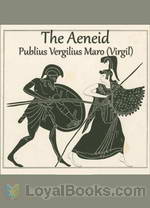 The Aeneid
The Aeneid
The Aeneid is a Latin epic written by Virgil in the 1st century BC that tells the legendary story of Aeneas, a Trojan who traveled to Italy, where he became the ancestor of the Romans. The first six of the poem’s twelve books tell the story of Aeneas’ wanderings from Troy to Italy, and the poem’s second half treats the Trojans’ ultimately victorious war upon the Latins, under whose name Aeneas and his Trojan followers are destined to be subsumed. The poem was commissioned from Vergil by the Emperor Augustus to glorify Rome... | |
 The Eclogues
The Eclogues
This book of poems, written between 42 en 39 BC, was a bestseller in ancient Rome, and still holds a fascination today. Held to be divinely inspired not only by the Romans themselves, but by the Medieval Catholic church, The Eclogues is one of the most beloved collections of Latin short poetry. | |
By: Anton Chekhov (1860-1904) | |
|---|---|
 The Seagull
The Seagull
The Seagull (Russian: Чайка, Chayka) is the first of what are generally considered to be the four major plays by the Russian dramatist Anton Chekhov. The play was written in 1895 and first produced in 1896. It dramatises the romantic and artistic conflicts between four characters: the ingenue Nina, the fading leading lady Irina Arkadina, her son the experimental playwright Konstantin Treplyov, and the famous middlebrow story writer Trigorin. | |
 The Cherry Orchard
The Cherry Orchard
The Cherry Orchard is Russian playwright Anton Chekhov's last play. It premiered at the Moscow Art Theatre 17 January 1904 in a production directed by Constantin Stanislavski. Chekhov intended this play as a comedy and it does contain some elements of farce; however, Stanislavski insisted on directing the play as a tragedy. Since this initial production, directors have had to contend with the dual nature of this play. The play concerns an aristocratic Russian woman and her family as they return to the family's estate (which includes a large and well-known cherry orchard) just before it is auctioned to pay the mortgage... | |
 Uncle Vanya
Uncle Vanya
Uncle Vanya (subtitled “Scenes From Country Life”) is a tragicomedy by Anton Chekhov. It is set on the failing country estate of a retired professor, Serebrakoff, who returns after a long absence with his beautiful young wife, and throws the household into confusion. Rivalry, unrequited love, illicit romance, and attempted suicide are the result, punctuated throughout by Chekhov’s sad, wistful humor. | |
By: Matthew Arnold (1822-1888) | |
|---|---|
 Celtic Literature
Celtic Literature
| |
By: Herbert Allen Giles (1845-1935) | |
|---|---|
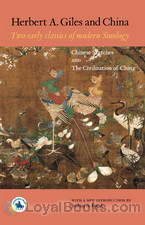 China and the Chinese
China and the Chinese
Herbert Allen Giles (1845-1935) spent several years as a diplomat in China and in 1897 was appointed Cambridge University’s second professor of Chinese. His published works cover Chinese language and literature, history and philosophy. This series of lectures, published as “China and the Chinese”, was given at Columbia University in 1902, to mark the establishment of a Chinese professorship there. The lectures were not intended for the specialist, more to urge a wider and more systematic study of China and its culture, and to encourage new students into the field... | |
By: Okakura Kakuzo (1863-1913) | |
|---|---|
 The Book of Tea
The Book of Tea
The Book of Tea was written by Okakura Kakuzo in the early 20th century. It was first published in 1906, and has since been republished many times. – In the book, Kakuzo introduces the term Teaism and how Tea has affected nearly every aspect of Japanese culture, thought, and life. The book is noted to be accessibile to Western audiences because though Kakuzo was born and raised Japanese, he was trained from a young age to speak English; and would speak it all his life, becoming proficient at communicating his thoughts in the Western Mind... | |
By: Epictetus (c.55-135) | |
|---|---|
 The Golden Sayings of Epictetus
The Golden Sayings of Epictetus
Aphorisms from the Stoic Greek. | |
By: Sholem Aleichem (1859-1916) | |
|---|---|
 Jewish Children (Yudishe Kinder)
Jewish Children (Yudishe Kinder)
Although written from a child’s perspective, this is not a kids book but a series of funny, poignant, and sometimes disturbing stories about life in a late 19th-century Russian-Jewish village — the world of my grandparents. Sholem Rabinovich (1859-1916) was born in Pereiaslav, Ukraine and later immigrated to New York. His short stories about Tevye and his daughters were freely adapted into the musical FIDDLER ON THE ROOF. Rabinovich’s will contained the following injunction: “Let my name be recalled with laughter or not at all.” His translator, Hannah Berman, was Irish of Lithuanian descent.Some of these stories may be too intense for younger children. | |
By: Sophocles (495-406 BC) | |
|---|---|
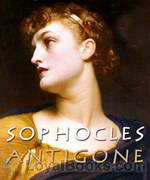 Antigone
Antigone
This is the final installment in Sophocles's Theban Plays, following Oedipus Rex and Oedipus at Colonus. Oedipus's daughter Antigone deliberately breaks the laws of Thebes when she buries her brother's body and is sentenced to death. She clashes with Creon, the King of Thebes, over what constitutes justice and morality: the laws of the state or the laws of the individual. | |
By: Nikolai Vasilievich Gogol | |
|---|---|
 Dead Souls
Dead Souls
Dead Souls by Nikolai Gogol, Russian writer, was first published in 1842, and is one of the most prominent works of 19th-century Russian literature. Gogol himself saw it as an “epic poem in prose”, and within the book as a “novel in verse”. Despite supposedly completing the trilogy’s second part, Gogol destroyed it shortly before his death. Although the novel ends in mid-sentence (like Sterne’s Sentimental Journey), it is usually regarded as complete in the extant form. In Russia before the emancipation of the serfs in 1861, landowners were entitled to own serfs to farm their land... | |
By: Paul Allardyce (1855-1895) | |
|---|---|
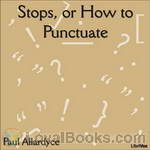 Stops, or How To Punctuate
Stops, or How To Punctuate
Throughout the ages, languages continue to adapt and change. English, being a relatively new language, is a nice example of that. Though the English vocabulary is continually evolving, the system of punctuation has remained constant for the most part. This means that grammar books from 1895 are still applicable today. Therefore, if the following sentence looks correct to you, perhaps listening to Paul Allardyce’s “Stops, or How to Punctuate” would be a good idea. | |
By: Eva March Tappan (1854-1930) | |
|---|---|
 Makers of Many Things
Makers of Many Things
How are friction matches made? How do rags and trees become paper? Who makes the dishes on our tables? Published in 1916, this children's book explains the origins of everyday items in an entertaining and informative way. There are plenty of illustrations, so please feel free to read along. | |
By: W. M. Flinders Petrie | |
|---|---|
 Egyptian Tales, translated from the Papyri, Series One
Egyptian Tales, translated from the Papyri, Series One
Brief, and in some cases incomplete, stories of magic from ancient Egypt. | |
By: Herbert Spencer (1820-1903) | |
|---|---|
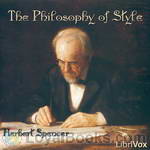 The Philosophy of Style
The Philosophy of Style
“The Philosophy of Style,” explored a growing trend of formalist approaches to writing. Highly focused on the proper placement and ordering of the parts of an English sentence, [Spencer] created a guide for effective composition. Spencer’s aim was to free prose writing from as much “friction and inertia” as possible, so that the reader would not be slowed by strenuous deliberations concerning the proper context and meaning of a sentence. | |
By: Marcus Tullius Cicero (106 BC - 43 BC) | |
|---|---|
 Cicero's Brutus or History of Famous Orators; also His Orator, or Accomplished Speaker.
Cicero's Brutus or History of Famous Orators; also His Orator, or Accomplished Speaker.
| |
 Academica
Academica
| |